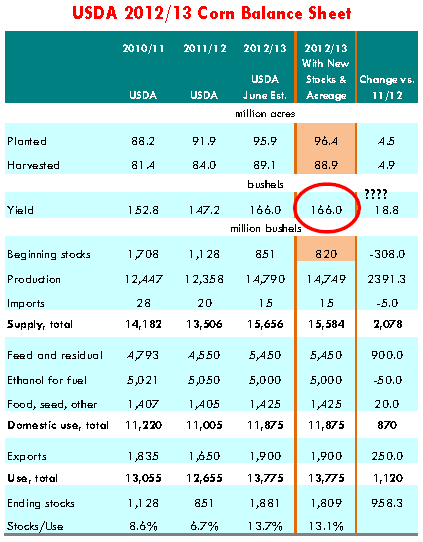



CME: Corn Balance Sheet Could be Minimal or Negative
US - USDA released this morning the results of two important surveys, the Grain Stocks and Acreage reports, write Steve Meyer and Len Steiner.On page 2 (please see link below) we have provided a detailed summary of the results, including pre-report estimates as well as comparisons to a year ago. Below are some of the highlights from the reports and implications for corn supplies in 2012-13.
- The report showed that US farmers planted 96.41 million acres with corn this past spring, almost half a million acres more than the initial March survey indicated and 4.5 million acres more than a year ago. Despite the higher acres, however, the impact on the corn balance sheet will be minimal or even negative. This is because the survey also showed that harvested acres are expected to be lower than a year ago (higher abandonment rates and silage use than earlier forecasts). Even with half a million more planted acres than expected, harvested acres are now expected to be about 200,000 acres lower than a year ago.

- As expected, US farmers took advantage of early wheat harvests
to double crop soybeans. As a result, soybean plantings are well
above the March survey indications and also above analyst
estimates. US farmers indicated they planted 76.08 million acres
of soybeans, half a million acres more than what analysts were expecting
and 1.1 million acres more than a year ago. While expected,
the higher soybean acres should help moderate some of the
bullishness in the soybean complex. But, as with corn, much will
depend on weather patterns in the coming weeks. The soybean
crop has not been damaged as much as corn by the recent high temperatures
but it is important to get some much needed rain in the
next two to three weeks.
- The USDA grain stocks for June were relatively close to prereport estimates. USDA reported that 1 June corn inventories were 3.148 billion bushels, about 33 million bushels lower than what pre-report estimates were expecting (-1.1 per cent). We made a small adjustment to the balance table to reflect this but, as you can see, the overall impact is minimal.
Other Factors to Watch: While these two reports are important
in defining the potential size of the US grain supply in 2012/13,
markets will likely remain focused on short term weather concerns.
There is mounting evidence that crops in the Eastern Corn Belt are
sustaining significant damage from current hot, dry weather. The
crop progress report on Monday indicated that 17 per cent of the corn crop in Illinois and 9 per cent of the corn in Indiana was silking. The acres
in the pollination phase will likely be even larger this week.
With little rain in the forecast for the ECB and temperatures
over 100 degrees, there is significant concern of yield losses. Already
some private forecasts are indicating they expect corn
yields for 2012-13 to be in the low 150s.
Also important for the market will be the situation in
Europe. A proposed solution to support banks directly has
buoyed risk trades this morning. This is generally bullish for
commodities and could add more fuel to the rally in the grain
complex.
Further ReadingYou can view the full report by clicking here. |








